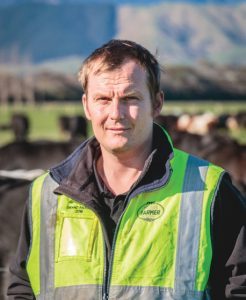Just-in-time training for 2IC or 3IC group members covers issues happening on the farm at that time. By Jackie Harrigan.
 Running a discussion group for dairy farm 2IC team members – the second-in-charge who is above the dairy assistant but below the boss in the pecking order, has shown both a need and a place for the model.
Running a discussion group for dairy farm 2IC team members – the second-in-charge who is above the dairy assistant but below the boss in the pecking order, has shown both a need and a place for the model.
It took a few years of pestering of a lot of people, dairy business manager for Pamu and programme instigator Tony Downman says, but the 2IC progression group has run successfully for the past five years, with a good record of retaining and progressing staff in the Manawatu/ Horowhenua region.
“We got the group up and running in 2017/18 with DairyNZ facilitating and Landcorp 2ICs for a couple of years and then opened it up to 2ICs from other groups around the region.”
Ten to 12 participants in the group was ideal, they found, and the group eventually split into a Horowhenua cluster and a Northern Manawatu group.
Tony sees the group as additional to traditional learning pathways.
“While a lot of the participants were involved in Primary ITO training, they were at all different stages and just ticking away with that, with varying degrees of completion – but to build the capacity of the team members we wanted more ‘just in time’ training.”

manager, Pamu
“A number of the guys in 2IC positions are part way through a level of training, but the animals/pastures modules might be 12 months away – we needed to condense the learning so we came up with the just in time model.”
Dowman explains just-in-time training for the 2IC or 3IC group members as covering off the issues that were happening on the farm at that time.
Meeting monthly, but skipping the busy calving period until the end of September, meant 10 sessions over 12 months, running through to the last day where they had a field trip to a different property.
Just-in-time training topics
- mating
- pastures/crops
- environment/compliance
- personal finance
- BCS/reproduction
- farm systems/ DairyBase
- pasture management
- goals and budgeting
- leadership
Meeting at one of the Pamu farms in the Moutoa cluster meant the discussion groups were held locally and lunch is organised for the group. The programme comprised 60-70% practical onfarm learning and 30-40% in the classroom. The technical learning was always supported with a handout/collateral to take away and usually followed up with homework before the next session. “Sometimes the group members are not keen to do homework, but it opens up channels to what is happening on their home farm, and enables the start of learning conversations with their manager.”
For example after the pasture management module the homework might be to go back to their home farm, talk to the farm manager, do a farm walk with them and do a feed wedge.
“Cementing the learning, engagement with the manager on a job that may traditionally have been the managers – it’s pitching the staff members above their current position and lifting their knowledge and engagement.”
What are the needs?
Staff retention and progression is a huge issue and Tony says encouraging the existing 2IC employees and progressive herd managers through making a discussion group available for them helps them aspire to the next level of management.
A lot of staff say they eventually want to be the leader, to be the boss, but aspirations need concrete skills and experience behind them.
Building leadership is hard and the group tries to pull that in on every session.
“We struggle to do it justice – there really needs to be outside leadership training.”
The discussion group helped to equip them for the next level of management, with flow on benefits for the current role.
“Growing your team internally is far better than having to go to the market – but there is high turnover in the industry at all levels,” he said.
“As well as the larger corporate farms, there are lots of opportunities on the smaller owner-operator or sharemilker farms.”
Success growing people
Despite the challenges of Covid derailing the progression discussion group for a couple of seasons, Dowman says the success of the group was in seeing a number of 2ICs successfully progress to other positions either up or sideways within the group of farms.
The discussion group format has been used in one other Pamu area, but not been widely replicated around the country although it is something both Pamu and DairyNZ agree would be beneficial.
“The resources are there and can be reshaped each year, depending on who is doing the facilitation.”
Pre-job training and foundation skills
Pamu has identified a gap in their business for dairy assistants’ skills training and moved to fill the void.
A skills day in May was run along similar lines to a Young Farmers practical day, with farm managers and 2ICs running modules and demonstrating foundation skills.
“It was a demonstration and coaching day for dairy assistants already in the role, to bring them up to speed and teach them the best and most efficient ways of doing tasks before the new season started.”
In the pre-job experience space, Pamu held an open farm day at the Pamu dairy cluster called Get Go, and invited 110 students from local colleges Manawatu College in nearby Foxton and Horowhenua College in Levin.
Over three sessions, the careers day saw the students learn about agriculture, sit in the side-by-side and do other practical skills in the hope that some of them might be encouraged to take up an agri career.
“We had good feedback from the teachers and figure if we can get a 5% uptake that’s potentially five new recruits for the dairy farm cluster.”
Pamu awards encourage staff
Annual farm performance awards within the Moutoa cluster of seven dairy farms is a great way to reward staff for success over a range of metrics, dairy business manager Tony Dowman says.
The company awards certificates and trophies within each cluster for:
- Dairy Assistant: DA of the year, runner up and rising star.
- Farm teams: best prepared, best repro performance, health and safety record, animals, best silage stack.
- National Top Farm awards are also awarded across the country: judged on metrics around systems, environment, animals, and three finance KPIs: cost of production, return on investment and EBIT/ha.





